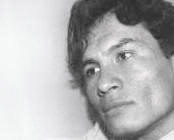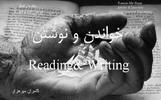|
|
Evolving times and
the wind of exile
Kamran Mir Hazar, a professional poet and
writer from Afghanistan, is currently living in exile,
in Iran. He has started his literary pursuit 15 years
ago and has published two books, Ketab-e- Mehr, a
collection of verse, and Reading and Writing, a
collection of articles about the new generation of
Afghan literature, which have, later, published under a
single title, Afghanistan Literature Engineering.
Two more of his works are poised to be
published soon. The strong undercurrents in his works
are of the new generation of Afghan literature. He is
famous for creating new and top-class cultural plans and
discussions. For the first time in Afghanistan, he has
been credited for proscribing that the Persian language
is better than the Dari, the classical form of language,
while promoting speech and literature. He believes that
the avatar of the Persian in Afghanistan will help
promote the Persian language among other Persian
speakers, too, while the Afghans trying to improve their
lifestyle. This is not an outlook dependent on
geographic details, as his open-ended outlook is joined
with exile. His verse is a scattered world that contains
nostalgia, the feeling of being an exile and the quest
for freedom. Any connoisseur could make their own space
while savouring through this poet’s verses.
Kamran Mir Hazar was
born inside the mountains in central Afghanistan and
immigrated, along with his family, to Iran, when he was
just six months old. He got educated in Iran and for
eight years he had worked for Iranian newspapers and
magazines. In 1995, he decided to publish his first
poetry collection, but the Iranian censor office didn’t
accept it. After that he chose seclusion and didn’t
publish any work in Iran. During this time he was
penning poems and teaching Afghan-exiled workers to read
and write.
In 1999 he released a contentious open
letter with the help of Hooshang Golshiri, which was
addressed to the heads of the UN, UNESCO and UNICEF
about the guiltless Afghan children, women, and men and.
The letter bore Afghan mixed myths, legends, fables and
historical places. Around 330 Iranian and Afghan
writers, poets and intellectuals have associated with
him and added signatures to that letter. Ahmad Shamlu,
Mahmood Dowlatabadi, Anvar Khamei and Naser Zarafshan
were some of those poets, writers and intellectuals. Two
days later, a media conference followed, and two of his
young poets were killed by the Iranian secret service in
Tehran, Toos ST.
Circa 2000 was yet another year for him
in which he could publish the first issue of RAHA,
covertly with the help of Afghan workers. The first RAHA
issue showed that it’s a protest movement that will not
accept censorship. After publishing three issues, the
Iranian secret service arrested his mother in Mashad and
held her captive for nearly one month. He couldn’t print
RAHA after that and chose the Internet for publishing
independent writers’ works and opinions.
He says: “Yes, the Internet is a free
space to publish works but we also have to face a global
kind of censorship that is mixed with local kinds. These
kinds of censorship are more concrete on the Net.” He
believes that some global organisations with catchy
charters are no different from the censorship enacted in
third world countries. ISBN is same like the censorship
in Iran. Books in Iran will go to the censor office to
register with ISBN. Human rights business is an epidemic
way to limit our countries, he thinks.
PEN in Afghanistan
with a tourist outlook is protecting ego-thinking
writers and poets who have to depend on the ego-thinking
establishment and military groups. PEN doesn’t have any
knowledge about the Afghan writers and with the
supporting ego-thinking groups is hitting to the new
generation of writers. PEN should back and use Yusa’s
experiences to work for a better future.
PEN has a classical system that does not
promote writers’ condition in Afghanistan. Kamran Mir
Hazar’s replies to two members of PEN (Terry Carlbom
International Secretary International PEN and Eugene
Schoulgin Chair of International PEN, Writers in Prison
Committee) are the best references that reviewed PEN’s
works in Afghanistan and Iran. It discloses why PEN’s
outlook about the writers in Afghanistan is so limited.
He says necktie is not a sign of a new poet or writer,
like many think.
The founder of RAHA-World Independent
Writers’ Home is also the founder of the first
international Persian e-book publisher and Kabul Press,
World Media Home, an online press agency associated with
RAHA in Exile.
Although Kamran Mir Hazar gets lots of
invitations from many newspapers to become an editor and
to work in global organisations, he, like most writers
in the third world, is forced to work hard for
livelihood and has not accepted any of that, and is
still fighting against censorship, global or local.
RAHA in exile>>> |

